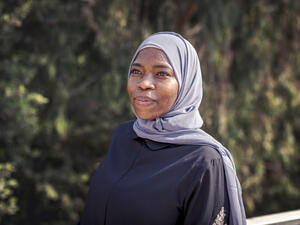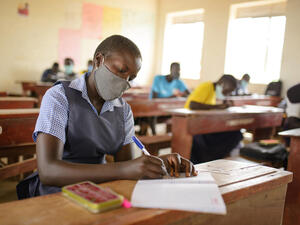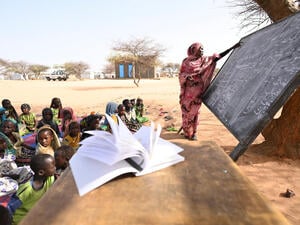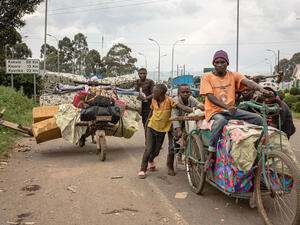German scheme eases refugee teachers back into class
German scheme eases refugee teachers back into class

Assistant teacher Alaa Kassab from Syria helps out in a social studies class in the Meusebach-Grundschule Geltow primary school in Germany.
POTSDAM, Germany – English teacher Alaa Kassab believes her education saved her life and, after she arrived in Germany as a refugee from Syria, she was keen to get back into the classroom to pass on her language skills to the next generation.
Thanks to a pilot scheme aimed at preparing newly arrived teachers for jobs in German schools, she is once more in front of a class.
The Refugee Teachers Programme, based at Potsdam University, is designed to help newcomers learn the ropes of the German education system and have them teaching again within just 18 months.
“Teaching English gives me most pleasure in life,” said Alaa, 25, who works full time as an assistant teacher in a German primary school. “I’m proud when I see my students are speaking or understanding English because of me. I know the language one day will affect their lives like it affected mine. Without English, I don’t think I would have left Syria and I might be dead by now.”
Before the conflict in Syria, Alaa taught at a bilingual primary school in her home city of Aleppo. She says her ability to speak English gave her the courage to escape the growing violence and seek refuge to Europe. Had she stayed, she fears she might have been a victim of the war in which many of her neighbours were killed.
Her language skills may have saved her during a life-threatening crossing to Greece on a smugglers’ boat. The vessel’s engine failed repeatedly and Alaa was able to speak English to volunteers on the phone who helped guide them to safety.
“I wanted to get back to teaching, but I had no idea how.”
She trekked across Europe and reached Potsdam, south-west of the German capital, Berlin. Having survived the journey in part thanks to her language skills, Alaa was keener than ever to continue teaching English to a new generation. However, her initial hopes of working were dashed when she found the German school system inaccessible to foreign teachers.
“When I got to Germany I was optimistic,” said Alaa, “I knew I wanted to get back to teaching, but I had no idea how to. It wasn’t just that the German language was missing, it was my understanding of the whole education system. But then I realised things don’t always go that fast here. That was a shock. Sometimes it can make you frustrated and angry.”

Art teacher Mais Saifo from Syria (centre) attends a class during the Refugee Teachers Program at Potsdam University.
Alaa discovered that teachers train for up to seven years in Germany and they must be able to teach two subjects, rather than just one as in Syria. To continue teaching, Alaa would have to start studying again from the beginning and would first have to be fluent in German.
Fast-tracked by the programme, Alaa and her classmates learned German to near fluency in less than two years. Within months, they were joining academic seminars for German trainee teachers, introducing them to teaching theories and practices. Most helpful for Alaa, though, was a placement shadowing a teacher at a high school, allowing her to experience first-hand the differences between the Syrian and German systems.
Alaa’s group of about 30 graduated from the programme last autumn and began year-long positions as assistant teachers. She and her classmates must still complete traditional teacher training before they can become fully qualified in the German system.
It is a daunting prospect. Some, like Alaa, plan to return to university in the future. Others are content just to have found a way back into the classroom and into work.
“I’ve already studied, now I want to work,” said Motaz Jarkas, 34, another English teacher from Aleppo and part of a group due to graduate from the Refugee Teachers Programme this spring.
“Refugees want to stand on their own feet again."
“Working means security for us at this stage. We’ve done our best, we’ve learned a lot, but it hasn’t been easy. We need stability and a future. That’s why this programme is so important for us.”
“It’s so vital for us to work,” agreed Motaz’s classmate Mais Saifo, 29, an art teacher from the Syrian city of Hama. “The first hurdle stopping us is the language. Now we’re beginning to integrate and we’re much more motivated because we can see our goal in reach. But there’s a lot for us to learn, teaching is so different here in Germany.”
Employment is a key part of the integration process and the benefits go well beyond self-sufficiency, says Dominik Bartsch, UNHCR representative in Germany.

Alaa works as an assistant teacher at the Meusebach-Grundschule Geltow primary school in Germany.
“Refugees want to stand on their own feet again. They have skills and talents and are eager for an opportunity to apply them meaningfully.”
He added: “Perhaps most importantly, refugee employment deepens social relations with the host society.”
Potsdam’s Refugee Teachers Programme, an experimental scheme with limited funding has stopped taking on new recruits, with the last due to graduate in March 2019. Organisers hope it will be copied in other universities as a way of using the skills of the many teachers among Germany’s new arrivals. For the lucky ones such as Alaa, continuing a career can mean more than financial independence.
“Being in a German work place has helped integrate me in so many ways,” she said. “It’s a great pleasure to have the chance to do it so quickly. The programme gave me the chance to start a new life in Germany. Now I have a future here.”








